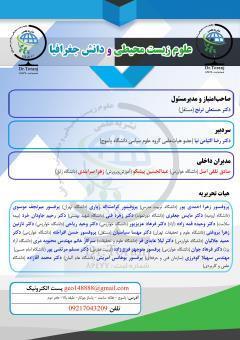خداشناسی و خداباوری در فلسفه و ادیان
محورهای موضوعی : Planning science
1 - دانشگاه فرهنگیان یاسوج
کلید واژه: خداشناسی, خداباوری, فلسفه, فلاسفه,
چکیده مقاله :
خدا آفریدگار جهان و کاملترین وجود، مفهوم محوری اغلب ادیان به ویژه ادیان ابراهیمی است. مفاهیم و تعاریف گوناگونی از خدا در ادیان و مذاهب و ذهن اشخاص وجود دارد. میان اعتقاد به خدا و دینداری رابطه ناگزیری برقرار نیست و برخی مردم که به دین معتقد نیستند، به خدا باور دارند. خدا در نظر شیعه، یگانه و سرمنشأ همه کمالات و علت هستیبخش همه موجودات است و ذاتی ازلی و ابدی دارد. هیچ موجودی شبیه او نیست. ذات او عین صفاتش است. واقعیتی بسیط و بیماهیت است. نه در دنیا و نه در آخرت قابل دیده شدن نیست و دارای علم و قدرت مطلق است، در همه جا حضور و ارتباطی تام با مخلوقاتش دارد. وجود خدا و برخی صفاتش با حس و عقل و فطرت اثباتپذیر است؛ ولی کُنه ذات نامحدودش با حس و عقل محدود قابل ادراک نیست. بعضی از فیلسوفان غربی و متألهان مسیحی اعتقاد دارند خدایی که در فلسفه اثبات می شود، مغایر با خدایی است که دین توصیفش می کند. برخی دیگر از اندیشمندان معتقدند خدای دین شایسته محبت و پرسش است، در حالی که خدای فلاسفه تنها یک واجب الوجود است که شوری در دل ها نمی افکند. مدعای دوگانگی خدای دین با خدای فلسفه از منظر قرآن و فلسفه اسلامی پذیرفتنی نیست؛ زیرا طبق قرآن، یکی از اوصاف منحصر در فرد الله تعالی، «شیء غیرمخلوق» است. واجب الوجود فلسفه تنها موجود بدون علت است. پس «شیء غیرمخلوق» وصف انحصاری الله قرآن و واجب فلسفه است. بنابراین مصداق الله و واجب الوجود یکی است. حقیقت مدعای دوم با تمرکز بر صفات ذاتی و فعلی خداوند است. اوصاف فعلی خداوند بیانگر روابط گوناگون خداوند با مخلوقات و انسان اند؛ اما صفات ذاتی چگونگی ذات الهی و کمالات او را توصیف می کنند.
God, the creator of the world and the most perfect existence, is the central concept of most religions, especially Abrahamic religions. There are various concepts and definitions of God in the minds of people and religions. There is no inevitable relationship between belief in God and religiosity, and some people who do not believe in religion believe in God. According to the Shia, God is the only one and the source of all perfections and the cause of existence of all beings and has an eternal and eternal essence. There is no other creature like him. His essence is the same as his attributes. It is a simple and immaterial fact. He cannot be seen neither in this world nor in the hereafter, and he has absolute knowledge and power, he is present everywhere and has a complete connection with his creatures. The existence of God and some of his attributes can be proved by sense, reason and nature; But its infinite essence cannot be perceived by limited sense and intellect. Some Western philosophers and Christian theologians believe that the God that is proven in philosophy is contrary to the God that religion describes. Some other thinkers believe that the God of religion is worthy of love and questioning, while the God of philosophers is only a wajib-ul-jood that does not throw salt in hearts. The claim of dualism between the God of religion and the God of philosophy is not acceptable from the perspective of the Qur'an and Islamic philosophy; Because according to the Qur'an, one of the unique attributes of Allah Almighty is "uncreated object". The necessity of philosophy is the only thing without a cause. Therefore, "non-created object" is the exclusive description of Allah in the Qur'an and obligatory for philosophy. Therefore, Allah's example and Wajib al-Wujud are the same. The truth of the second claim is by focusing on the inherent and current attributes of God. God's current attributes express God's various relationships with creatures and humans; But the inherent attributes describe the nature of God and His perfections..
